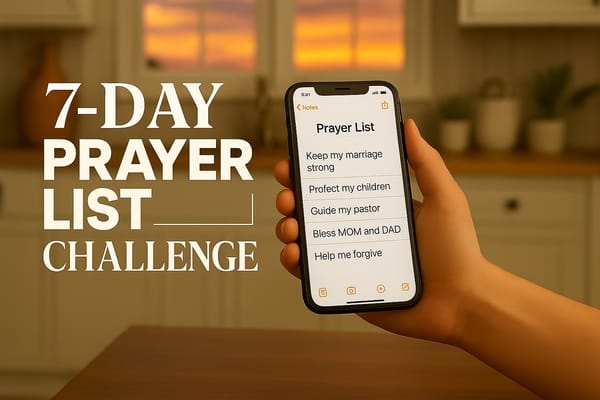Day 5: Intercession & Spiritual Warfare – Pray Like a Warrior

“For we do not wrestle against flesh and blood, but against the rulers, against the authorities, against the cosmic powers over this present darkness…”
— Ephesians 6:12
Let’s Start Here
We live in a time when even some believers quietly dismiss what Scripture makes plain.
I’ve had thoughtful, sincere Christians tell me that demons and spiritual warfare are relics of the past—that in 2025, everything must be psychological, emotional, or circumstantial.
But this assumes the battle has changed.
It hasn’t.
This article stands on a different foundation:
- The Bible still means what it says.
- There is a real enemy.
- Prayer is a weapon.
If life has felt unusually heavy lately, you’re probably not imagining it.
You’re under fire. And you’re not alone.
This is for those who acknowledge we’re in a spiritual battle.
Let’s step into the battle.
When Prayer Becomes Too Safe
Some prayers stay too polite. Predictable. Neat.
They never bleed. They never fight.
But biblical prayer was never meant to be tame.
It is not just communion with God—
it is confrontation with darkness.
And you’ve felt it:
- When your home turns into a battlefield over nothing
- When anxiety hits like a freight train
- When division flares where there used to be peace
- When you're jolted awake, your mind twisted by tormenting thoughts
This isn’t just emotional.
It’s not just physical.
It’s spiritual.
Safe prayers don’t survive in a war zone.
Real prayer pushes darkness back.
It shields your household.
It strikes back at the enemy.
God didn’t give you armor for a picnic.
He gave it because you’re in combat.
Restoring a Biblical Practice
Intercession and spiritual warfare aren’t fringe practices—they are central:
- Abraham interceded for Sodom
- Moses stood in the gap for Israel
- Samuel said, “Far be it from me that I should sin by failing to pray for you”
- Daniel fasted and was resisted by demonic powers
- Jesus told Peter, “I have prayed for you, that your faith may not fail”
- Paul commanded: “Pray at all times in the Spirit” (Ephesians 6:18)
“The prayer of a righteous person has great power as it is working.”
— James 5:16
The early Church didn’t whisper.
They didn’t play defense.
They prayed in power. And darkness lost ground.
The Problem: Prayer Without Power
Somewhere along the way, prayer got too safe.
Too calm. Too explainable.
We stopped praying like warriors and started praying like worriers.
We forgot:
- That demons are real
- That bondage is real
- That confusion, addiction, torment, and deception are often strongholds, not just struggles
So we prayed soft prayers…
And we saw soft results.
The Invitation: Pray Like a Warrior
God has given you weapons—
not earthly, but spiritual with divine power to demolish strongholds (2 Corinthians 10:4).
To intercede is to stand in the gap.
To go to war for someone else.
Spiritual warfare means:
- Refusing to tolerate lies
- Breaking agreement with fear
- Rebuking torment instead of accommodating it
“Truly, I say to you, whatever you bind on earth shall be bound in heaven,
and whatever you loose on earth shall be loosed in heaven.”
— Matthew 18:18
You speak truth where the enemy has spoken death.
You wield the Word like a sword—sharp, precise, unbreakable.
This isn’t hype.
It’s not about volume or theatrics.
It’s about authority in Christ.
You don’t fight for victory.
You fight from it.
A Voice from Church History
Anthony the Great once said:
“The devil dreads fasting, prayer, humility, and the love of Christ.”
The early Church didn’t question whether demons existed.
They cast them out.
They didn’t theorize about warfare.
They lived in it.
Prayer wasn’t seasoning.
It was survival.
Their lifeline in enemy territory.
And here’s the truth:
Dismissing the reality of demons is a modern deception.
For most of human history, people knew there was evil beyond the visible.
They didn’t treat spiritual warfare as metaphor—
they saw it for what it was: a fight for souls.
Dr. Michael Heiser put it plainly:
“If you strip the supernatural out of the Bible,
you’re not left with the Bible—you’re left with a book of your own making.”
Picking and choosing Scripture isn’t discernment.
It’s unbelief.
The early Church wasn’t naive.
They were awake.
They knew what they were up against.
And they prayed like it.
So must we.
Psalm 91 — Heaven’s War Song
Psalm 91 isn’t a lullaby.
It’s a spiritual battle anthem.
Dr. Michael Heiser called it one of the Bible’s most unapologetically supernatural texts.
Let’s simplify its firepower into five truths:
1. God’s Territory (vv. 1–4)
The psalm opens with names like “Most High” (‘Elyon)—a direct echo of Deuteronomy 32, where God assigned nations to lesser divine beings.
Psalm 91 is a claim of shelter in God’s dominion.
2. Ancient Evil Has Names (vv. 3–6)
Words like "pestilence" (deber), "destruction" (qeteb), and "arrow" all carried spiritual connotations in the ancient world.
These weren’t just metaphors—they pointed to real demonic powers.
The Dead Sea Scrolls even bundled Psalm 91 with exorcism hymns.
3. Satan Knows the Psalm (vv. 11–12)
This is the passage Satan quoted to Jesus during the wilderness temptation (Matthew 4:6).
But he left out verse 13:
“You will tread on the lion and the serpent.”
That verse spells his defeat.
4. Jesus Holds the Line
Jesus doesn’t fall for Satan’s bait.
“You shall not put the Lord your God to the test.”
He doesn’t jump.
He doesn’t perform.
He walks the long road to the cross—where He tramples the serpent forever (Colossians 2:15).
5. What It Means for You
Psalm 91 is a battlefield commission.
Speak it like a soldier:
“I will tread on lions and serpents. Under my feet they go.”
Pair it with Ephesians 6 and Revelation 12.
Let Scripture paint the target—then pull the trigger.
Pray it like a warrior:
Most High God, I dwell in Your shadow. Every Resheph arrow, every Deber plague, every Qeteb destruction is disarmed in Your presence. Command Your angels over my household today. Let the serpent be crushed under the heel of Jesus—through the authority of His cross. Amen.
Today’s Practice: Intercede and War
Step onto the battlefield.
This is not journaling.
It’s combat.
1. Choose Your Mission
Ask the Holy Spirit: Who needs covering today?
- A child under attack
- A spouse in despair
- A friend losing their grip
- A neighbor trapped in darkness
Name them. Stand in the gap.
2. Identify the Stronghold
What needs to fall?
- Fear?
- Addiction?
- Bitterness?
- Shame?
Call it out. Bind it. Pray for breakthrough—today.
3. Wield the Sword
Declare Scripture aloud:
- Ephesians 6:10–18 — Armor up
- Psalm 91 — Fortress language
- 2 Corinthians 10:3–5 — Tear down strongholds
4. Pray With Blood-Bought Authority
You are not a beggar.
You are a royal warrior—seated with Christ (Ephesians 2:6).
You bear His name. His power. His Spirit.
So pray like it.
What does that look like?
- When fear grips your child at night:
“God has not given us a spirit of fear, but of power, love, and a sound mind! In Jesus’ name, fear must leave this room now!”
(2 Timothy 1:7) - When addiction has its claws in someone you love:
“I break the grip of addiction over [name] by the authority of Jesus Christ. Where the Spirit of the Lord is, there is freedom. Let that freedom come now!”
(2 Corinthians 3:17) - When you feel darkness pressing into your own mind:
“I have the mind of Christ. No weapon formed against me will prosper. Every accusing tongue is silenced. I cast down every lie of the enemy now—in the name of Jesus.”
(Isaiah 54:17, 1 Corinthians 2:16) - When division strikes your home:
“I rebuke the spirit of strife in Jesus’ name. This home belongs to the Lord. Let peace return. Let the love of Christ reign here again.”
(James 3:16, Colossians 3:15)





